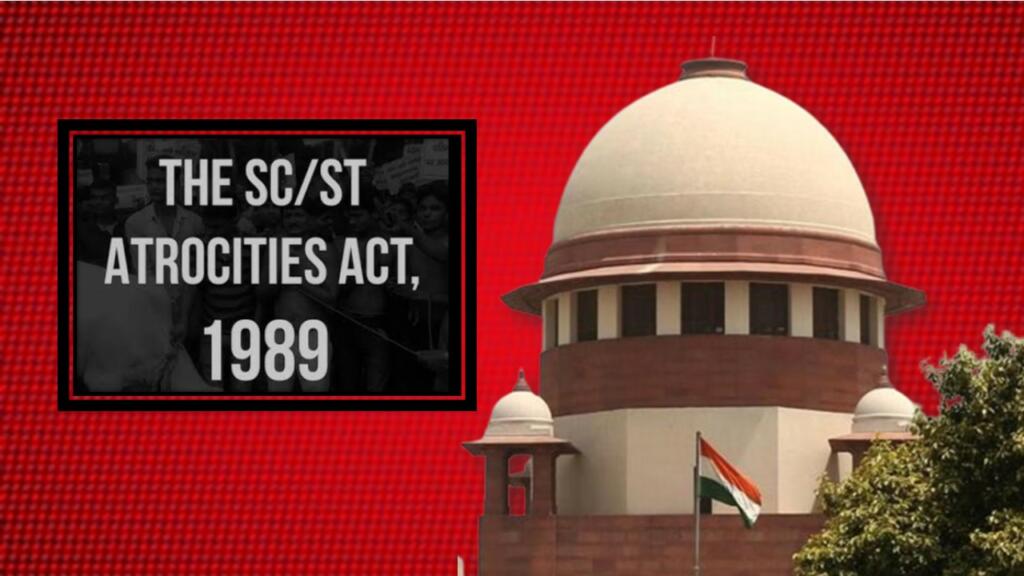SC/ST Act: Atrocities are not only immoral acts, but they also corrupt the perpetrators and erode the moral fabric of the society. The insidious nature of “Caste-based Oppression” creates a wound in humanity that corrupts its essence and shatters the lives of its direct victims. The perpetuation of this evil leaves a lasting legacy of pain and serves as a reminder of the capacity for evil within all of us.
The misuse of the Scheduled Castes and Scheduled Tribes (Prevention of Atrocities) Act (SC/ST Act) exacerbates this situation and highlights the need to fight against it for the betterment of individuals and society as a whole.
Misuse of SC/ST Act: A Plague
In March 2020, the Supreme Court issued a ruling that weakened ‘biased matrix’ of the Scheduled Castes and Scheduled Tribes (Prevention of Atrocities) Act of 1989. The justification for this ruling was to prevent innocent individuals from being falsely accused, thereby avoiding misuse of the law. The magnanimity of the SC/ST Act was strengthened by the 2015 amendment, which punished caste-based slurs and denied anticipatory bail to the accused.
The 2015 Amendment Act further strengthened the 1989 act by including acts such as shaving the head, mustache, or similar acts, under the ambit of the Act, as it was considered demeaning to the dignity of members of the Scheduled Castes (SCs) and Scheduled Tribes (STs), as atrocities.
Also read: Laws on Custodial Deaths
Supreme Court Dictum on SC/ST Act Misuse: Impact & Implications
In the historic verdict of Dr. Subhash Kashinath, the Apex Court held that the provisions of the Act of 1989 are being misused as such the amendment is arbitrary, unjust, irrational and violative of Article 21 of the Constitution of India. There could not have been any curtailment of the right to obtain anticipatory bail under Section 438 Cr.PC. Consequently, prior scrutiny and proper investigation were held to be necessary.
In 2018, the Supreme Court ruling on the Scheduled Castes and Scheduled Tribes (Prevention of Atrocities) Act, 1989 played a crucial role in diluting the provision for immediate arrest of accused persons, requiring prior approval from the appointing authority in the case of a public servant, and from the senior superintendent of police in the case of a non-public servant.
Also read: Anti Ragging Act has failed to change the ground reality
Further, the verdict weakened the provision for automatic registration of an FIR, requiring a preliminary inquiry to be conducted before registering a case under the act. The emphasis on arrest as a deterrent was weakened, with the court stating it should not be a standard procedure and the principle of innocence until proven guilty must be upheld.
These changes were perceived as a setback in the fight against caste-based violence and discrimination and were widely condemned by Dalit organizations and advocates. Consequently, the government was forced to bring the 2018 amendment to restore the original provisions of the 1989 Act.
Also read: The legal force behind the politics of minority appeasement
SC/ST Amendment: Protecting Dalit Dignity
The 2018 amendment to the SC/ST Act, 1989 unimaginably reinstated the provisions that were diluted by the 2018 Supreme Court verdict, allowing the immediate arrest of accused persons without the need for prior approval. Further, the said Act incorporated the provision for the appointment of public prosecutors in each district to ensure timely prosecution of cases. In addition, it provided for the setting up of exclusive special courts for the trial of cases under the act to ensure their speedy disposal.
The refurbished Act vowed to enhance the punishments for offenses under the act, making them more stringent. Thereby, the Act also provided for inclusion of new offenses such as acts that deny access to water and sanitation facilities, and those that infringe on the cultural and educational rights of Scheduled Castes and Scheduled Tribes.
It also provided for the constitution of a National Commission for Scheduled Castes to monitor and implement the provisions of the act. It also mandated that state governments should provide adequate compensation to victims and their families within a specified time frame.
Also read: Religion is born out of cow: Legal landscape on cow protection in India
Later, the Supreme Court confirmed the constitutional validity of the 2018 Scheduled Castes and Scheduled Tribes (Prevention of Atrocities) Amendment Act. A panel led by Justice Arun Mishra stated that a preliminary inquiry is not required before filing an FIR under the act and approval from senior police officials is not necessary.
The said verdict of the Apex Court reaffirmed “biased mechanism” that is inclined against the interests of the ‘unreserved community’ that are exposed to the menace of misuse. Consequently, it can be said that the SC/ST Act that was created to prevent an atrocity, itself became a tool of atrocity for the innocent class of citizens, without providing them adequate opportunity to be heard.
Support TFI:
Support us to strengthen the ‘Right’ ideology of cultural nationalism by purchasing the best quality garments from TFI-STORE.COM
Also Watch:
https://www.youtube.com/watch?v=p0uhlBDlGLo
